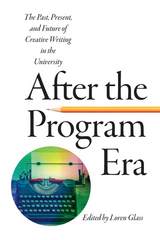
After the Program Era explores the consequences and implications, as well as the lacunae and liabilities, of McGurl’s foundational intervention. Glass focuses only on American fiction and the traditional MFA program, and this collection aims to expand and examine its insights in terms of other genres and sites. Postwar poetry, in particular, has until now been neglected as a product of the Program Era, even though it is, arguably, a “purer” example, since poets now depend almost entirely on the patronage of the university. Similarly, this collection looks beyond the traditional MFA writing program to explore the pre-history of writing programs in American universities, as well as alternatives to the traditionally structured program that have emerged along the way.
Taken together, the essays in After the Program Era seek to answer and explore many of these questions and continue the conversations McGurl only began.
CONTRIBUTORS
Seth Abramson, Greg Barnhisel, Eric Bennett, Matthew Blackwell, Kelly Budruweit, Mike Chasar, Simon During, Donal Harris, Michael Hill, Benjamin Kirbach, Sean McCann, Mark McGurl, Marija Rieff, Juliana Spahr, Stephen Voyce, Stephanie Young
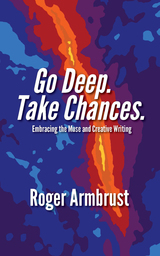
What are the drivers of creative writing:: passion, drive, and fear of rejection? What is the cardinal rule: honesty (to a vision, a voice)? Armbrust, an editor and creative-writing instructor, argues that the struggle to write is reflective of the deeper spiritual consciousness of the writer.
He challenges writers to address their inner demons, being honest to their truest selves, and to wrestle their eepest doubts in their quest to produce the best literature.
“One semester, my creative mentor William Packard asked me to teach his poetry-writing course at New York University’s School of Continuing Education and Professional Studies. He did so because I had taken the course, he considered me a good poet, and knew I was teaching a professional-writing course of my own at NYU. Each time I’d walk in to instruct his poetry-writing class, I’d scratch on the chalkboard two brief sentences: Go Deep. Take Chances. These two suggestions represent, I believe, the keys to creativity.” Many nutsand- bolts pointers (gleaned from decades of writing and advising others) benefit writers of all experience levels.
This book leads writers to better understand and execute the extremely focused work of creative writing, while at the same time enjoying a fuller sense of self, serenity and fulfillment.
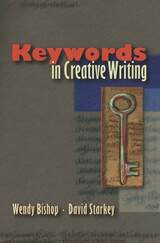
Wendy Bishop and David Starkey have created a remarkable resource volume for creative writing students and other writers just getting started. In two- to ten-page discussions, these authors introduce forty-one central concepts in the fields of creative writing and writing instruction, with discussions that are accessible yet grounded in scholarship and years of experience.
Keywords in Creative Writing provides a brief but comprehensive introduction to the field of creative writing through its landmark terms, exploring concerns as abstract as postmodernism and identity politics alongside very practical interests of beginning writers, like contests, agents, and royalties. This approach makes the book ideal for the college classroom as well as the writer’s bookshelf, and unique in the field, combining the pragmatic accessibility of popular writer’s handbooks, with a wider, more scholarly vision of theory and research.
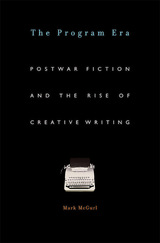
In The Program Era, Mark McGurl offers a fundamental reinterpretation of postwar American fiction, asserting that it can be properly understood only in relation to the rise of mass higher education and the creative writing program. McGurl asks both how the patronage of the university has reorganized American literature and—even more important—how the increasing intimacy of writing and schooling can be brought to bear on a reading of this literature.
McGurl argues that far from occasioning a decline in the quality or interest of American writing, the rise of the creative writing program has instead generated a complex and evolving constellation of aesthetic problems that have been explored with energy and at times brilliance by authors ranging from Flannery O’Connor to Vladimir Nabokov, Philip Roth, Raymond Carver, Joyce Carol Oates, and Toni Morrison.
Through transformative readings of these and many other writers, The Program Era becomes a meditation on systematic creativity—an idea that until recently would have seemed a contradiction in terms, but which in our time has become central to cultural production both within and beyond the university.
An engaging and stylishly written examination of an era we thought we knew, The Program Era will be at the center of debates about postwar literature and culture for years to come.
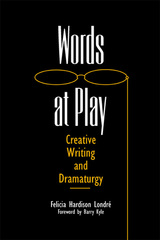
In this encompassing and accessible introduction to dramaturgy, Felicia Hardison Londré promotes the dramaturgical essay as both an art form and as a method for improving creative writing skills. Words at Play: Creative Writing and Dramaturgy includes Londré’s essays on plays produced at several regional professional theatre companies interspersed with instructive examples for writing more clearly, economically, and compellingly.
Beginning with an introduction that outlines the purpose of the dramaturgical essay as well as its usefulness as a tool for teaching how to write for the theatre, Londré provides numerous examples of this specialized literary genre culled from program essays she has written for Missouri Repertory Theatre, Nebraska Shakespeare Festival, Heart of America Shakespeare Festival, American Heartland Theatre, and Cincinnati Playhouse in the Park. Words at Play: Creative Writing and Dramaturgy contains more than sixty complete essays and pertinent selections from twenty others.
Drawing on personal and professional experiences as a teacher and dramaturg, Londré considers plays from timeless classics, including those of Shakespeare and Chekhov, to contemporary favorites and a few unusual and largely unknown pieces. Words at Play: Creative Writing and Dramaturgy furthermore incorporates introductory paragraphs that are informal and personal yet cogent and critical, providing readers with object lessons in both writing style and analysis. Taking the reader into her confidence, Londré also shows how a dramaturg develops a print relationship with other theatre artists and the community. A foreword by Royal Shakespeare Company associate artist Barry Kyle addresses the evolving role of the dramaturg in Britain and America. Dakin Williams, brother of playwright Tennessee Williams, provides a letter.
READERS
Browse our collection.
PUBLISHERS
See BiblioVault's publisher services.
STUDENT SERVICES
Files for college accessibility offices.
UChicago Accessibility Resources
home | accessibility | search | about | contact us
BiblioVault ® 2001 - 2024
The University of Chicago Press









